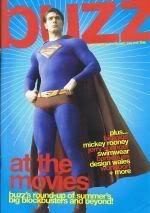Pathology (2008)
 Remember when gore in a horror movie actually made you feel something? Sick, disgusted, scared, revolted -- anything, at all, besides amused or vaguely bored? Recent "extreme" films like the Saw franchise, Frontiere(s), Hostel Part II, et al, seem to have turned gore into a spectator sport, where the audience is complicit in the torture and grue, baying for blood, enjoying it rather than dreading it. Pathology, on the other hand, is gory in a completely different way. It's disgusting. There's no way to glory in Pathology's rotting corpses; it's just really, really gross. Which, oddly enough, is probably the strength of the movie.
Remember when gore in a horror movie actually made you feel something? Sick, disgusted, scared, revolted -- anything, at all, besides amused or vaguely bored? Recent "extreme" films like the Saw franchise, Frontiere(s), Hostel Part II, et al, seem to have turned gore into a spectator sport, where the audience is complicit in the torture and grue, baying for blood, enjoying it rather than dreading it. Pathology, on the other hand, is gory in a completely different way. It's disgusting. There's no way to glory in Pathology's rotting corpses; it's just really, really gross. Which, oddly enough, is probably the strength of the movie.
The film's rather high concept premise is that a group of talented medical students, bored and sickened by a general public they percieve as beneath them, devise a twisted game. Each of them takes a turn at murdering someone, and then when the corpse reaches the pathology labs it's up to the other players to figure out how -- with the result that each person playing the game must come up with a more ingenius, less detectable way to off someone. New boy Ted (played by Milo Ventimiglia, presumably in an attempt to make him slightly likeable) gets drawn into the game, seduced by both the intellectual challenge and by Juliette, one of the other pathologists. Soon, things are spiralling out his control, with one member of the group enjoying playing God a little too much. When Ted's unknowing fiancée gets a little too close to the action, the rules are thrown out of the window, and complete and utter chaos reigns. Almost every type of depravity imaginable is thrown at the screen, often all in the same scene. It's a breathless, pacy film that doesn't let up for a second -- which, given that it was written by the same guys behind Crank, perhaps isn't particularly surprising.
This isn't a criticism I'd level at many films, but at just 93 minutes, Pathology is rather too short. There's not enough character development: Catherine and Chip, two of the less essential med students, get almost entirely forgotten about, and there's nowhere near enough closure for Juliette, who's one of the more interesting characters in the film. Oddly, the subplot with Ted's fiancée is almost completely pointless, and it's one of the major let-downs of the film that it's so obvious from the outset what's going to happen between them. The rest of the film is much more inventive than that, and the last act sags slightly because in spite of the ostensive urgency of the situation, everything ends up precisely the way we all already knew it would; it's something we've all seen far too many times before. There's not quite enough development of any relationship in the film; Pathology relies a little too heavily on cinematic shorthand and casting choices to carry much of the characterisation.
At the same time, that cinematic shorthand does its job, so that nothing feels like its come too far out of left field, but it would have been nice to see some nuance - and let's face it, you're not going to get that out of Milo Ventimiglia's performance. The cinematography, too, is often a little amateurish (particularly in the first scene where Ted gets drunk - oh, dear) and the editing is choppy, so that as soon as a character has finished his or her lines, he or she will be swiftly cut off and the next scene will start. That suggests to me that maybe the film was originally longer and has been cut for time, as there's so much left out that should have been included; mere speculation, of course, but I wonder if another cut exists that fills in some of the blanks?
If not, it might just be that the extreme gore in the film is expected to be enough to bring in an audience. And judging by the number of "Extreme Editions" of horror movies cluttering supermarket shelves right now, that supposition might be correct. The bloodshed in Pathology is much, much nastier than anything else in recent memory -- probably because all the butchery is carried out on corpses, rather than living people, so it can afford to be rather more graphic in its depictions of dismemberment. What really makes Pathology so shocking, though, is the lack of respect for humanity demonstrated by its principal characters; there's a scene in which one of the students smashes a trolley into a wall, sending a corpse tumbling to the floor, and reacts with just an "oops." The idea that medical students -- who are training to be doctors, to whom we all regularly entrust our health and wellbeing -- could be such utter sociopaths is chilling.
Although it's nowhere near so eloquent, Pathology evokes Donna Tartt's The Secret History. As in the novel, Pathology's students get carried away by their perception of their own brilliance, imagining themselves as existing beyond the laws of regular society, with disastrous consequences. By the end of the film, it's impossible to like anyone; they've all revealed themselves to be total sociopaths. On the other hand, isn't this what horror movies are supposed to be like? Wise-cracking killers and daft teenagers are tired clichés now -- the genre desperately needs something new and original, preferably something scary, and gross, and that makes you want to hide your eyes behind your hands (though you'll still peek through the gaps between your fingers, because despite everything you still can't stand to miss a moment of it). Pathology is by no means perfect, and I'm not sure I've got the stomach to sit through it again any time soon, but if an extended cut were to surface, I think my curiosity would, ultimately, get the better of me. And since I can't think of many films I actually want to see more of, in the end, I think I've got to consider that a resounding success.
IMDB link










3 comments:
No snarky reviews in weeks? What gives?
Um, mostly, I've been writing on Den of Geek and not reposting anything!
I'll try to a) port some DoG stuff over here and b) write some new stuff soon!
Ah, I don't check Den of Geek as oft as I should as it lacks an all encompassing RSS feed. I'm pretty lazy.
Post a Comment